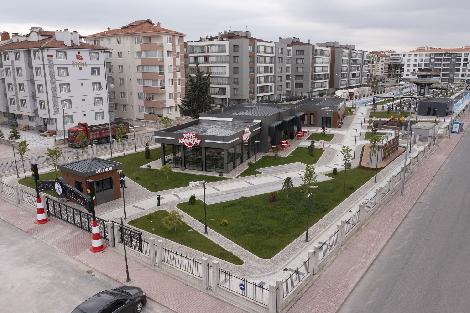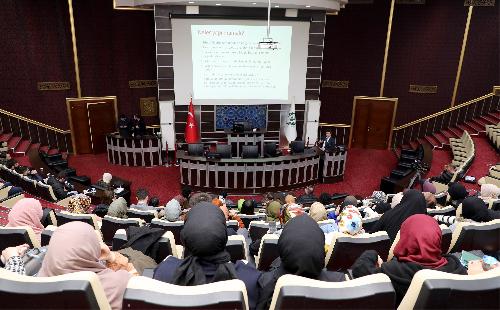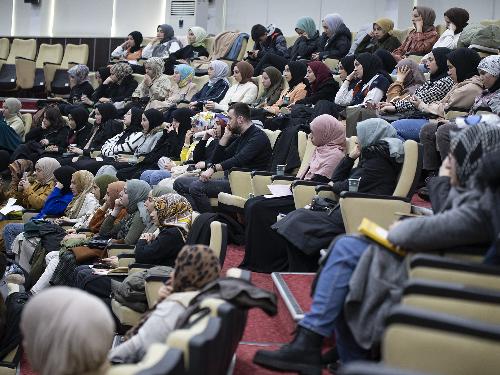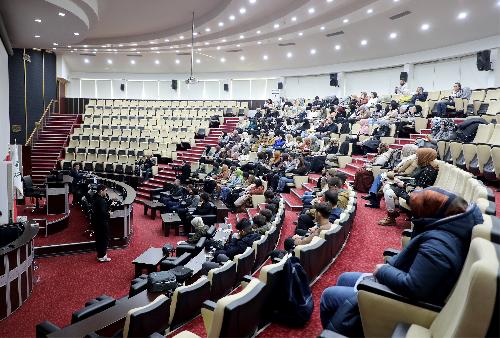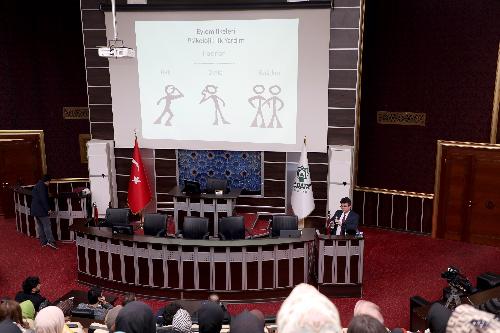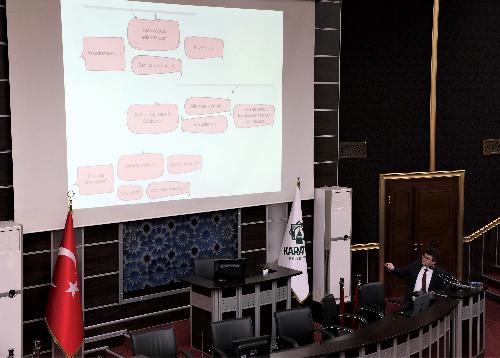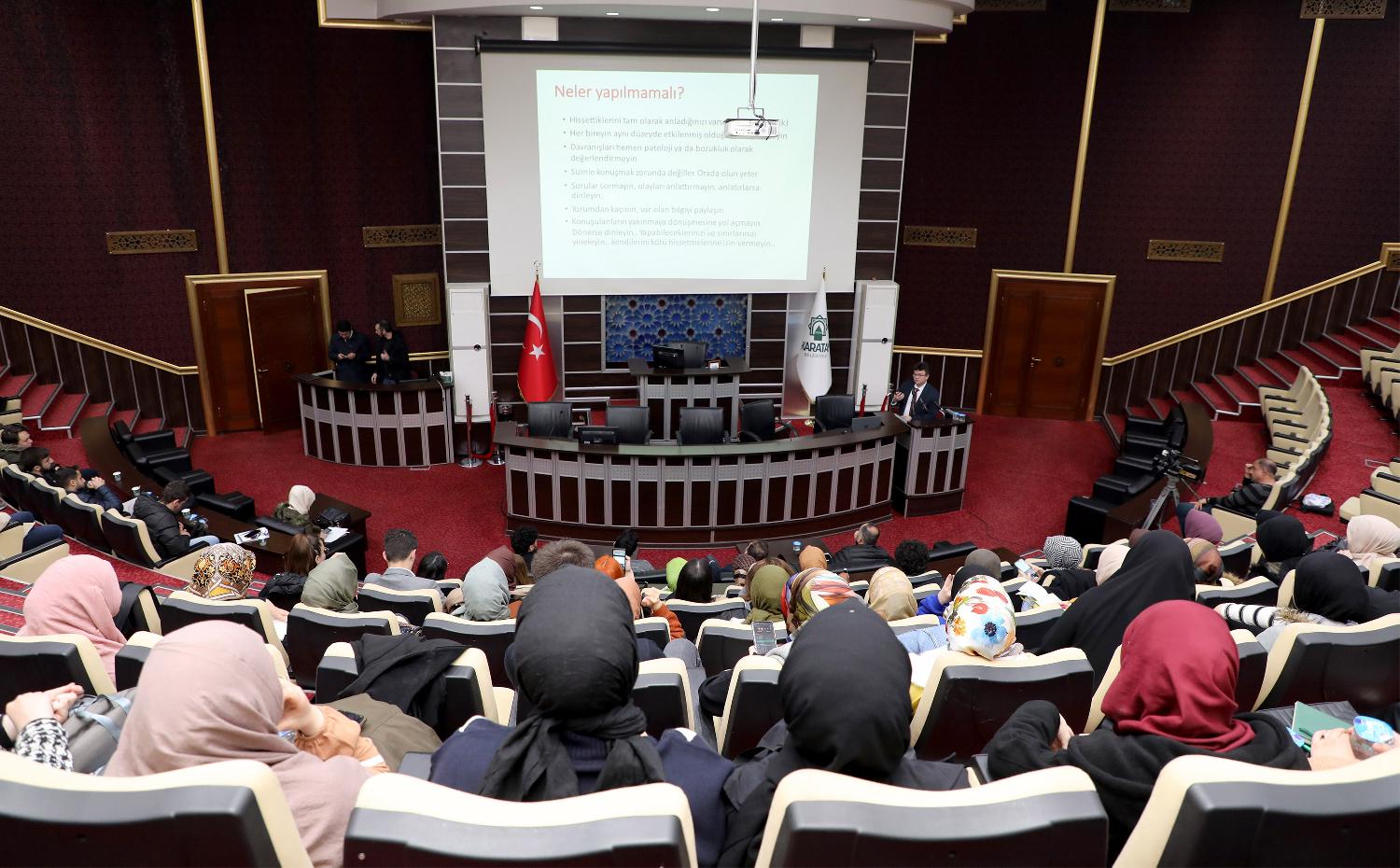
ÇETIN: THREE IMPORTANT RULES AGAINST TRAUMA; LOOK, LISTEN, LINK
Karatay Municipality City Council and Sen Değerlisin Association for the volunteers who will take care of the families and their children hosted in Konya after the large earthquakes. In the seminar titled "How Should We Approach Children After a Disaster", Assoc. Prof. Dr. Fatih Hilmi Çetin in Child and Adolescent Psychiatry told volunteers how families and children should be approached after natural disasters. Fatih Hilmi Çetin who emphasized that natural disasters are a traumatic process stated that "Look, Listen, Link" is the most important rule to prevent such a process from turning into a stress disorder.
Karatay Municipality organized a seminar on “How Should We Approach Children After Disaster” in cooperation with the City Council and Sen Değerlisin Association.
The seminar held at the Karatay Municipality's Council Chamber was held for the Karatay City Council, the presidents and coordinators of the Youth, Women and Children's Assemblies within its body, the volunteers in the Working Groups, the members of the Sen Değerlisin Association, its volunteers and other NGOs.
TRAINING SEMINAR WILL CONTRIBUTE TO OUR APPROACH TOWARD EARTHQUAKE VICTIM FAMILIES
Abdurrahim Arslan, the City Council President of Karatay Municipality, who made a short speech before the seminar, stated that the training seminar will contribute to the earthquake victim families and their children hosted in Konya.
Abdurrahim Arslan said, “I wish Allah's mercy upon all our citizens who lost their lives. Condolences to all of us as a country. We are going through very difficult times. We have been working hard since the first moment of the earthquake. Today, we have here the presidents and coordinators of Youth, Women's, and Children's Assemblies, all our volunteers in the Working Groups, members and volunteers of the Sen Değerlisin Association, representatives of non-governmental organizations, educators, and professional experts. We began to host more than 30 thousand guests in Konya. We needed training on how to treat the families and children whom we hosted in Konya. At this point, our trainer Fatih Hilmi Çetin, who is an expert in his field, provides support. In the next process, we will be able to approach our children more consciously. Our Karatay Municipality has been working hard from the first moment of the disaster and supports all kinds of programs.”
THREE IMPORTANT RULES AGAINST TRAUMA; LOOK, LISTEN, LINK
Participating in the seminar as a speaker, Assoc. Prof. Dr. Fatih Hilmi Çetin in the field of Child and Adolescent Psychiatry made presentations on many topics such as the right approach to children and families after the earthquake, shock, acute stress response, post-traumatic stress disorder, and psychological first aid, and shared his knowledge and experiences.
Assoc. Prof. Dr. Fatih Hilmi Çetin who said that natural disasters are a traumatic process underlined that the most important rule for this process not to turn into post-traumatic stress disorder is "Look, Listen, Link".
Hilmi Cetin; “We will dress the wounds together. These kinds of events are traumatic. Natural disasters are one of the primaries among them. Naturally, everyone who has experienced this process from the very beginning is personally influenced. What kind of mental and spiritual process appears after trauma? The return to normal life begins after an average of one month. The acute stress period is a normal process, a process that must be lived. It should only be supported in terms of being lived rightly. All the symptoms experienced during the acute stress period are natural reactions. Somnipathy might be experienced during this period. Physiological problems such as fear of low or loud noises and the anxiety of an earthquake, accompanying blood pressure problems, and increased heart palpitations occur. This process, which starts in a day or two, is a period that could last to a month on average. We will also confront these symptoms in our guests in Konya. This is a normal process to experience. The physiological density begins to decrease approximately one month after the acute stress period and we return to the normal level and continue our lives. The effect of trauma is not permanent. However, there is a group that is affected by trauma, this period of stress does not decrease and turns into a psychiatric disease known as a post-traumatic stress disorder. The critical situation here is that we have to do our part to prevent those experiencing acute stress from post-traumatic stress disorder. We are planning psychological first aid in 3 stages; Look, Listen, Link,"
PLAY WITH CHILDREN
Assoc. Prof. Dr. Fatih Hilmi Çetin, who stated that earthquakes affect children in terms of creating trauma, attracted attention to the fact that some discourses should be avoided when approaching children who experienced the earthquake.
Fatih Hilmi Çetin concluded his speech as follows; “You shouldn't talk about horror stories when you're around children. Again, the story of the person who experienced the earthquake should not be shared on social media. When a person reads his or her life story elsewhere, it actually causes him to relive the trauma he has solved. Children should be allowed to ask questions. Children repeat questions more often in moments of trauma, and as adults, we should calmly answer children's questions every time. Clear, concise, and close sentences should be formed. The images, stories, and losses exposed by children since the first day of the earthquake may cause them to have difficulties in emotion regulation. We should tell the children that earthquake is a natural phenomenon and we should explain that we are not helpless against earthquakes with scientific data. These activities can be carried out according to the child's age. For example, families can prepare an earthquake kit together. They can put water in the corners of the rooms. Drop-cover-holdon movements can be done together. When this is done, the child will have the perception that he can cope with the earthquake, so his/her anxiety will decrease. Again, the most important thing for children is to play. Try to speak by looking into their eyes and using words and explanations they can understand. Introduce yourself and let them know you are there to help him/her. Learn their names. If their families are with them, support their families to take care of the children. Try to chat about their interests according to their age. When these are done, we see that acute stress quickly returns to normal.”
 Karatay 3°C
Karatay 3°C



